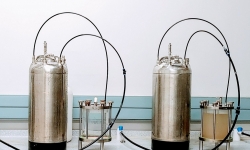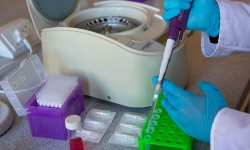Keeping a watchful eye on our water
Since the start of the COVID-19 pandemic, the CSIR Microbiology and Parasitology Laboratory has screened many water samples for the presence of SARS-CoV-2 and other infective viruses. Water samples were received from many of the country’s leading water utilities, as well as utilities from some neighbouring countries. Researchers have not detected any infective viruses in any of the drinking water samples that have been analysed to date.
Since the start of the COVID-19 pandemic, the CSIR Microbiology and Parasitology Laboratory has screened many water samples for the presence of SARS-CoV-2 and other infective viruses. Water samples were received from many of the country’s leading water utilities, as well as utilities from some neighbouring countries. Researchers have not detected any infective viruses in any of the drinking water samples that have been analysed to date.
Scientists do not consider SARS-CoV-2 to be a water-borne pathogen because these respiratory viruses lack the characteristics that typically provide environmental durability. “Robust water-borne pathogens usually survive environmental stresses well because they have attributes like DNA genomes and resistant cell walls; the COVID-19 viruses lack these features,” says CSIR microbiologist Wouter le Roux, who has worked in the field of water-related microbiology for 15 years.F
Despite this knowledge, the water sector needs to be certain that drinking water is free of COVID-19-causing viruses. The CSIR is a pioneer in the development of viral detection methods, and specifically those methods used for the monitoring of cytopathogenic viruses in water.
The CSIR Microbiology and Parasitology Laboratory can test raw (source) and final (treated) drinking water samples for the presence of certain viruses.
“The test screens water samples for viruses that infect human-like cells, and the COVID-19 virus can be detected using this approach,” says Le Roux.
“We can report that no infective viruses were detected in any of the drinking water samples that were analysed during this period,” he says. According to the World Health Organization, there have been no reports of viable SARS-CoV-2 viruses in treated drinking water.
“It is important to mention that the test does not identify the specific viral agents; instead it warns us of the presence of certain viruses that can cause human disease upon consumption,” he says.
The laboratory will continue to provide the service to the water sector, ensuring that the safety checks remain in place; not just for COVID-19, but also for other waterborne diseases that will continue to pose health risks to vulnerable communities.




